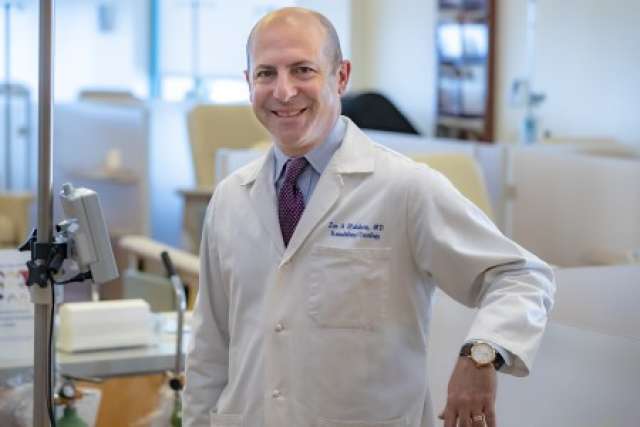For patients with advanced pancreatic cancer, a four-drug chemotherapy regimen resulted in greater longevity than a two-drug protocol in a global clinical trial led by a UCLA Health oncologist.
The results are significant because of how difficult it is to treat metastatic pancreatic cancer, said Zev Wainberg, MD, co-director of the UCLA GI Oncology Program and a member of the UCLA Jonsson Comprehensive Cancer Center.
“If you look at the history of pancreatic cancer, the last time there was an improvement in overall survival was 2012 – so over a decade ago, despite dozens and dozens of studies having been done,” he said.
Dr. Wainberg, global principal investigator for the trial, presented the findings Jan. 20 at the American Society of Clinical Oncology Gastrointestinal Cancers Symposium in San Francisco.
Among the 770 people from around the world who participated in the study, those who received the four-drug combination had an overall survival of 11.1 months, compared with 9.2 months for those who got the two medications.
“The benefit, unfortunately, was only about two months, which shows how much progress we still need to make. But it was better,” Dr. Wainberg said. “We’re talking about one of the most difficult diseases. We do consider it statistically and clinically meaningful.”
Aggressive and deadly
An estimated 62,000 Americans were diagnosed with pancreatic cancer last year. Symptoms may include jaundice, pain and weight loss, but they typically don’t appear until the cancer has spread.
Routine screening is not available except for very high-risk people with certain familial syndromes, Dr. Wainberg said.
While overall cancer death rates in the U.S. are declining, they are on the rise for pancreatic cancer, according to last year’s Annual Report to the Nation on the Status of Cancer.
By 2030, Dr. Wainberg said, pancreatic cancer is forecast to displace colon cancer as the second-leading cause of cancer death in the U.S. Lung cancer is No. 1. Both lung and colon cancer are more common.
“The incidence is rising a little bit but it’s also because the survival isn’t getting that much better,” Dr. Wainberg said. “It’s not for lack of trying that we haven’t been able to improve outcomes.”
He said there are many complicated reasons that make pancreatic cancer so challenging to treat. For one, most patients are diagnosed at stage 4.
“In the very large majority of patients, it has already spread from the pancreas to other organs,” he said. “That makes it distinct from the majority of other cancers that are often found more quickly.”
Additionally, unlike a majority of other cancers, it does not have a large number of actionable genetic targets that can be used for developing novel therapies, he said. For other cancers, targeted therapies can help the immune system destroy cancer cells or starve cancer cells of hormones that drive their growth.
“There’s a biological difference in the cancer itself,” Dr. Wainberg said.
As a result, that leaves only chemotherapy as a treatment option for advanced disease. Dr. Wainberg said he conceived of the study idea because he wanted to help treating physicians know the best regimen for their patients.
“For about a decade now, we’ve had the two-drug combination and we’ve had a separate four-drug combination but they haven’t been compared head-to-head,” Dr. Wainberg said. “We didn’t know which one was better.”
Study outcomes
The study, called NAPOLI 3, enrolled patients with pancreatic ductal adenocarcinoma, which makes up 95% of pancreatic cancers. Participants were from 250 sites in more than 20 countries, including a small number from UCLA.
The four-drug regimen, called NALIRIFOX, consisted of liposomal irinotecan, 5-fluorouracil/leucovorin and oxaliplatin. The two-drug therapy was comprised of nab-paclitaxel and gemcitabine.
In addition to increased longevity for people who took the four drugs, progression-free survival – meaning the cancer didn’t worsen – increased for that group. It was 7.4 months versus 5.6 months with the two-drug regimen.
Dr. Wainberg said the combination of the four chemotherapies provided a synergistic benefit.
“They’re metabolized through different pathways,” he said. “They’re partners and work together.”
Among the two study groups, some side effects were worse and some were better. For instance, for people on the two-chemo regimen, anemia and neuropathy were more common. For the four-drug group, people experienced more diarrhea and nausea.
“In any chemotherapy regimen, it’s always a tradeoff of side effects,” Dr. Wainberg said. “You’re trading one set of problems for another.”
Patient responses to questions about quality of life between the two study arms are still being analyzed. Dr. Wainberg said the study will be submitted soon for publication in a medical journal.
Patient care and research
The four-chemotherapy combination in Dr. Wainberg’s study included a newer version of one drug. As a result, the manufacturer, Ipsen Pharmaceuticals, will seek Food and Drug Administration approval for the updated combination.
The drug, liposomal irinotecan or brand name, Onivyde, is already FDA-approved as a second-line treatment for pancreatic cancer. Ipsen sponsored the trial.
In the meantime, doctors can prescribe the existing four-drug combination that uses the older drug, Dr. Wainberg said.
“In practice, for now, I think it means that the two-drug regimen is no longer the preferred choice,” he said.
Dr. Wainberg said next steps for research will include continuing to improve the combination of chemotherapies to improve survival rates.
“How do we make it better or nuance it in a way to give more than two months?” he said. “That’s our next mission.”
Other topics include working to identify subsets of patients that respond better to certain drugs.
“We’ve got 100 more questions to answer and we’ll keep going,” he said.
Courtney Perkes is the author of this article.




